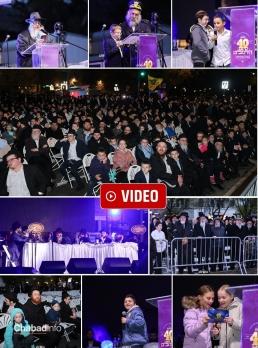Rubashkin: A Peek Behind The Scenes
As the public gleans tantalizing tidbits about behind-the-scenes dynamics that led to Sholom Rubashkin’s release from prison, something mysterious and elusive continues to radiate across those watershed moments • Full Article
As the public gleans tantalizing tidbits about behind-the-scenes dynamics that led to Sholom Rubashkin’s release from prison, something mysterious and elusive continues to radiate across those watershed moments.
“Over the past eight years,” wrote The Des Moines Register a day after President Trump commuted Sholom’s sentence, “a bipartisan chorus representing seemingly every ideological perspective present in American politics has weighed in on the Rubashkin case, either to demand a Department of Justice review or to ask for a presidential commutation of his long sentence.”
How did this happen? Who got so many influential people outside our community to listen to the truth and actually care? There was a time when no one wanted to get involved because the name “Sholom Rubashkin” had been so maligned. How did that change?
His Own Community Had to Love Him
The answer is that Sholom’s own community had to first believe in him and support him. As painful as it is to admit, that brotherhood and loyalty was at first grievously absent. By the time a hostile media got finished with Sholom him back in 2008-2009 at the time of the Postville raid and ensuing federal trial, he had few friends.
The man who had for many decades used his wealth to benefit not only his own people and his employees, but the city of Postville itself, donating large sums to a host of town charities and good works, had been reinvented by the media as a greedy, heartless corporate boss who exploited children and the poor.
And many of his fellow Jews bought it.
Into this desolate landscape stepped one man who had the integrity to see the truth – that Sholom was the victim of a modern-day blood libel. He also had the resources, as the editor of this newspaper, to push back against the lies. Rabbi Lipschutz had the courage to do what nobody else dared to do at that time: to stand solidly behind Sholom Rubashkin and expose the terrible injustices being perpetrated against him.
Almost all other voices were careful to remain neutral. But there are times when neutrality is not a virtue but a sin.
In the beginning he wasn’t taken seriously. People scoffed, made jokes, rolled their eyes. But he persisted, forming a nucleous of askonim who together with him spread the message until the tide of public opinion slowly changed. Slowly, the community learned the truth about Sholom Rubashkin, and the crimes being done to him under the guise of legality
Only when his own community adopted him and began to love and support him, did public opinion begin to shift in the secular world. That is perhaps what spawned the first seeds of redemption.
The Boomerang Effect
In retrospect, the negative forces that drove the ruthless government campaign against Sholom paradoxically contributed to this shift toward redemption As devastating as they were, these virulent forces ultimately boomeranged.
Darkest dark led to lightest light,” remarked Mrs. Roza Hindy Weiss in a wide-ranging interview with the Yated.
She noted some of the lowest points in the saga for her family, such as prosecutors originally calling for a life sentence for her father. Yet, this so outraged judicial officials that it triggered, as early as 2009, a harsh protest to Judge Linda Reade by six former US Attorneys General.
“Our attorney said it was hopeless to approach these men, they would never get involved with a case that is ongoing. But to our amazement, they did. Rabbi Zvi Boyarsky of Aleph Institute and others somehow pulled it off.”
Subsequent letters of protest in the next few years by over 100 high-ranking judicial and legal luminaries buttressed by support from dozens of members of Congress, all grew out of that first outraged response to the prosecutors’ overkill.
Another example of the “boomerang effect” was in relation to the court’s refusal to acknowledge the powerful exculpatory evidence in the 2255 Petition and the Merits Brief, and the clear evidence of government misconduct. These appeared to be serious legal setbacks for the defense at the time.
Yet these defeats, disheartening as they were at the moment, became the fuel that powered support for a sentence commutation at the highest levels of government. Treated with denial and indifference in Iowa, the evidence of gross injustice in the Rubashkin case galvanized some of the most respected legal authorities in the country.
“An entire family is being destroyed by a draconian sentence that was meted out based on the underpinnings of fraud and deceit,” wrote former U.S. District Judge Charles Renfrew in the Des Moines Register in 2016, in a sign that public opinion was radically shifting.
“With potential buyers being thwarted and intimidated at every turn, and a false witness being brought into the court to flagrantly lie and counter bidders’ testimony, the legal wrongdoing evident in the Rubashkin case constitutes an extraordinary miscarriage of justice.”
“The evidence of a complete breakdown in the justice system is what mobilized outrage across the political spectrum,” affirmed Sholom’s LA-based attorney, Mr. Gary Apfel.
Hashgacha’s Dazzling Footprint
The sense of wonder over Sholom’s release grows with every discovery of spine-tingling “coincidences” that turned out to be game-changers, and acts of courage and humanity that took this saga to its jubilant finale. Only now are some of these astounding twists and turns coming to light. Gazing beyond their cloak of serendipity, who can fail to see the dazzling footprint of Hashgacha?
Did it just happen that person A knew person B who knew of someone else who had in his possession the “smoking gun” evidence long sought by the defense?
Could it be random coincidence that a series of “cold calls” by activist Boyarsky of Aleph Institute reaching out for support for Sholom, kindled the dynamic involvement of two former deputy US Attorneys General? Their outrage over the travesty of justice spilled over to others; they set in motion a chain reaction that helped turn the tide.
Like a giant mosaic in which countless tiny pieces fuse into a stunning whole, the Rubashkin case drew together an unlikely and eclectic mix of individuals, organizations and communities. Many were from opposite sides of the political, ethnic and religious spectrum, often totally unaware of their ideological counterparts in the quest for justice until the “mosaic” was complete.
Mrs. Roza Hindy Weiss elaborated on some of these fascinating connections and pivotal breakthroughs in the case. She spoke of many individuals who made her father’s quest for justice “a life mission,” notably the editor of this paper, Rabbi Pinchos Lipschutz, attorney Gary Apfel and Rabbi Zvi Boyarsky.
She recalled the heartfelt sympathy and efforts of Rabbi Chaim Dovid Zweibel of Agudath Israel, and unsung heroes such as CPA Brian Dror; NY bankruptcy attorney Scott Steinberg; Rabbi Sholom Druchman of Kollel Chabad; former deputy US Attorneys General Michael Mukasey, Philip Heymann, Charles Renfrew and Larry Thompson; former FBI director Louis Freeh; attorney Alan Dershowitz; and many, many others who gave of their time and money for the effort.
He’d Have To Be Brilliant. And Unafraid.
“When we went to work on the 2255 Petition, we knew we needed to do some deeper digging into the financial value of Agriprocessors when it first declared bankruptcy,” explained Mrs. Weiss as she pondered one of the many breakthroughs in the case.
“We wanted to prove the auction bids were high enough to pay the bank’s $27 million loan, but we needed our own independent assessment of the plant’s value before the government scared off the bidders. So we were scouting around for an accountant who’d be willing to get involved in this mess. He’d have to be brilliant. And not afraid of the prosecutors.”
The man for the job turned out to be CPA Brian Dror, an LA-based close friend of attorney Apfel. When asked for his help, Dror threw himself into the task with all his heart. “We swamped him with boxes and boxes of documents…” recalled Mrs. Weiss. “He went through everything… he even communicated with my father who knew of assets the government had not included in their audit.”
Dror found the government’s valuation of $68.5 million was too low by at least ten million dollars. That meant that had the plant been sold to any of the serious bidders, there would have been more than enough profit to repay any outstanding creditors. The amount of loss inflicted by “bank fraud” would have been zero, making the fraud a “victimless” crime and shortening Sholom’s sentence by about 25 years.
To prove the plant was really worth this much, the defense needed to show, in addition to the new audit, that bidders were prepared to pay upwards of $30 million for it. But at the time of Sholom’s trial in 2009, the defense was able to produce a sworn affidavit from just one bidder, Mordechai Korf. He testified he had wanted to purchase the plant but had no choice but to back off after prosecutors informed him of the “no-Rubashkin” edict and their right to exercise forfeiture of the property.
Judge Reade disdained Korf’s affidavit as of no value, saying she chose instead to credit the testimony of government witness Paula Roby who denied there was a “No-Rubashkin” policy.
Reade thus rejected the defense’s argument that the prosecutors, not Sholom, were responsible for the bank’s $27 million loss. Based on this reasoning, she wrote, she felt justified in imposing a 27-year prison sentence.
The Bidders Come Forward
It wasn’t until five years later that an additional eight bidders were persuaded, after months of effort, to come forward. Each had flown down to Iowa in 2008 with intentions of bidding at the bankruptcy auction. In their sworn affidavits to the court, each testified that he had been forced to meet privately with prosecutors during the auction. The bidders all described very similar scenarios, with prosecutors aggressively insisting on the exclusion of all Rubashkins from any management role in the new company. Each bidder had been threatened with government forfeiture of the plant if, as the new owners, they failed to heed the prohibition.
“These nine affidavits were pure dynamite,” said Mrs. Weiss, “They proved that the defense allegation of “No-Rubashkin” rule was true, that the government was lying.”
“What we needed, in addition, was the testimony of someone who had no connection to my father. Someone who the government couldn’t try to discredit as they did Mr. Korf, saying he was a friend of Sholom Rubashkin and his testimony was therefore suspect.”
In a blaze of Divine providence, CPA Brian Dror turned out to be a business acquaintance of the one person who fit this criteria: the government-appointed bankruptcy trustee of Agriprocessors, Joseph Sarachek.
“What are the odds that these two men would know each other? How crazy is that?” Mrs. Weiss laughs. “Brian flew to New York to meet with Mr. Sarachek…Eventually, after lengthy discussions, Mr. Sarachek agreed to meet with Gary and Stephen Locher in LA in Brian Dror’s office. At that meeting he provided very valuable information to the defense team.
Encouraged by former US Attorney General Michael Mukasey and Rabbi Shlom Duchman, head of Kollel Chabad, Mr. Sarachek eventually provided his own sworn affidavit. In it, he attested to the prosecutors’ manipulation of the bankruptcy auction through the No-Rubashkin policy, and how difficult it made his job of selling the plant.”
“The Sarachek affidavit put to rest any claims the prosecutors had that the bidders were lying,” Gary Apfel affirmed. “It was a major breakthrough in the case.”
Smoking Gun Evidence
In another game-changing “coincidence” around this same period, attorneys Gary Apfel and Iowa-based Stephen Locher discovered the infamous “Rieland memo” of a 2008 government meeting with bankruptcy trustee Sarachek and his counsel, attorney James Rieland.
The memo reconstructs the scenario in which the “No-Rubashkin” policy had been imposed.
“No-Rubashkins is very important to us—non-negotiable,” US Attorney Rich Murphy had announced to trustee Joe Sarachek. He and assistant U.S. Attorney Peter Deegan insisted there could be “no involvement of Rubashkins from any standpoint (control or benefit), in the successor entity to Agriprocessors.”
The new evidence thus shone a light on government schemes –later denied by the prosecutors—that led to the massive bank loss for which Sholom was falsely blamed.
Rieland’s notes reveal that government witness Paula Roby, who would later deny under oath at the sentencing hearing that a “No-Rubashkin” policy had been issued, actively participated at this very meeting where prosecutors spelled it out.
Roby’s brazen charade at the hearing was matched by that of the prosecutor who knowingly solicited her perjured testimony, the transcript shows. Their duet performance infuriated those in the courtroom who knew the truth. But their cover might never have been blown if not for the discovery of the Rieland memo.
“We didn’t know it existed,” recalled Mrs. Weiss. “We were looking for a different document and in the process, stumbled onto this one!”
The memo was the defense’s long sought “smoking gun” and its impact, coupled with the net effect of the bidders’ and Sarachek’s sworn affidavits as part of the Merits Brief, was explosive.
An unprecedented letter outlining the new evidence and signed by over 100 former high level Department of Justice officials, U.S. Attorneys, federal judges and legal experts, including three former Attorneys General of the United States, petitioned the U.S. Attorney of Iowa’s Northern District, Mr. Kevin Techau, to right a severe miscarriage of justice.
“There is new evidence of false testimony and willful manipulation [of the bankruptcy auction] that exacted the most possible punitive sentence for Rubashkin. That makes this a shocking case of prosecutorial misconduct,” wrote legal luminaries Judge Charles Renfrew and former U.S Attorney James Reynolds in the Des Moines Register. [“Prosecutors, Judges Decry Rubashkin Witch Hunt,” 5/8/2016]
Reynolds called on Techau to rectify the miscarriage of justice, or be “as culpable” as the perpetrators.
The Long Trek To Iowa
Before the powerful Merits Brief with the explosive memo was filed, Gary Apfel coordinated a meeting in Cedar Rapids, Iowa between three distinguished former deputy US attorneys general—Charles Renfrew, Philip Heymann and Larry Thompson—and U.S. Attorney Techau. In an interview with Yated, Apfel, who took part in the meeting, described its highlights.
“Why are we here, Mr. Techau?” Heymann, a man in his eighties, asked the U.S. Attorney at the start of the meeting. “We’re here because we care about justice, about integrity. They are very important to us.”
He then produced the incriminating Rieland memo that exposed the prosecutors’ misconduct and explained its significance to Techau. There were some explosive moments as Heymann lost his composure, lashing out at Techau for the way “your prosecutors engineered a gross miscarriage of justice in order to punish Aaron Rubashkin by destroying his company!”
“We offered to bury the notes and never to publicize them, if his office would commute Sholom’s sentence to time served,” recalled Apfel. “I explained to Techau that his prosecutors had taken a remarkably kindhearted, decent, generous human being and painted him as a monster…”
“Had he agreed to our proposal, he could have spared his office a great deal of negative publicity. But he did not. In the end, thanks to President Trump, Sholom got out anyway. The difference is that the world found out what an abomination this case was, and what a stain it became on the Department of Justice.”
“Renfrew, along with judicial colleagues Philip Heymann and Larry Thomspon, worked tirelessly for Sholom’s cause,” added Apfel. “These men believe deeply in the American justice system. They gave some of the best years of their lives to the Department of Justice as deputy US attorneys general. That’s why Sholom’s case pained them so deeply.”
Another year and a half passed after the Cedar Rapids meeting as the relay of defense court filings continued, all of them ultimately denied by Judge Reade. In the meantime, activists continued marshalling support in government and legal circles.
***
That Chanukah, Sholom learned that his final appeal had been rejected, bringing to an end all hope of a legal remedy. Yet his letters to his family remained buoyant, full of glowing divrei Torah.
“Something wonderful happened tonight,” he wrote. “I was actually allowed to be alone in the room for two hours after lighting the menorah, with no guard present – unheard of here! So I had two beautiful hours with neiros Chanukah…”
The intense tefillos that must have permeated the room as he gazed into the flames in those private moments are left to the imagination.
A few days later, he was free.
526
Join ChabadInfo's News Roundup and alerts for the HOTTEST Chabad news and updates!











































I believe that many/most/if not all of Chabad believed in him from the beginning and said Tehillim for him and his wonderful family, whom many of us know one way or another.
This is in addition to all the malachim that were created from the Rubashkins’ many acts of kindness.
Yashar Koach to those who were able to get things moving in a natural way to bring about his yeshua!!!
I feel the Geulah winds blowing strong!!!
Sholom was released after sitting for 8 years 8 months and 8 days.
8 = l’maalah min hateva! = giluy elokus = Geulah NOW!!